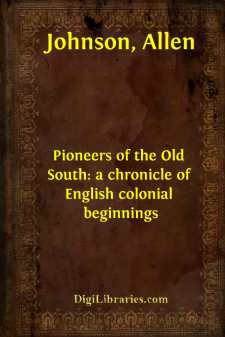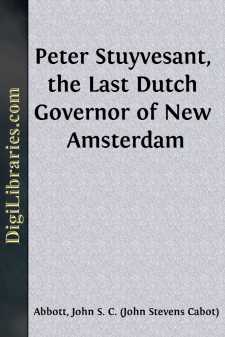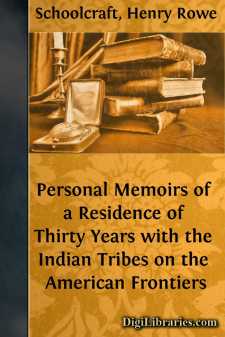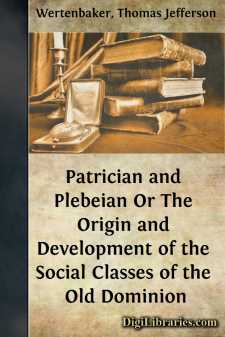History
- Africa 30
- Americas (North Central South West Indies) 50
- Ancient 68
- Asia 58
- Australia & New Zealand 8
- Canada 41
- Caribbean & West Indies 1
- Civilization 20
- Eastern Europe 12
- Europe 310
- Expeditions & Discoveries 60
- General 77
- Historical Geography 1
- Jewish 9
- Latin America 3
- Medieval 8
- Middle East 13
- Military 248
- Revolutionary 8
- Study & Teaching 5
- United States
- Western Europe 56
- World 13
United States Books
Sort by:
by:
Allen Johnson
CHAPTER I. THE THREE SHIPS SAIL Elizabeth of England died in 1603. There came to the English throne James Stuart, King of Scotland, King now of England and Scotland. In 1604 a treaty of peace ended the long war with Spain. Gone was the sixteenth century; here, though in childhood, was the seventeenth century. Now that the wars were over, old colonization schemes were revived in the English mind. Of the...
more...
A SKETCH. Fellows of the Association: In the endeavor to chronicle the lives and achievements of Kentucky Pioneers in Surgery, I shall not attempt the resurrection of village Hampdens or mute inglorious Miltons. The men with whom I deal were men of deeds, not men of fruitless promise. It may with truth be said that from Hippocrates to Gross few in our profession who have done enduring work have lacked...
more...
CHAPTER I. DISCOVERY OF THE HUDSON RIVER. The Discovery of America.—Colonies.—The Bay of New York.—Description of the Bay.—Voyage of Sir Henry Hudson.—Discovery of the Delaware.—The Natives.—The Boat Attacked.—Ascending the Hudson.—Escape of the Prisoners.—The Chiefs Intoxicated.—The Return.—The Village at Castleton.—The...
more...
CHAPTER I. ANCESTRY—BIRTH—BOYHOOD. My family is American, and has been for generations, in all its branches, direct and collateral. Mathew Grant, the founder of the branch in America, of which I am a descendant, reached Dorchester, Massachusetts, in May, 1630. In 1635 he moved to what is now Windsor, Connecticut, and was the surveyor for that colony for more than forty years. He was also, for many...
more...
CHAPTER XL. FIRST MEETING WITH SECRETARY STANTON—GENERAL ROSECRANS—COMMANDING MILITARY DIVISION OF MISSISSIPPI—ANDREW JOHNSON'S ADDRESS—ARRIVAL AT CHATTANOOGA. The reply (to my telegram of October 16, 1863, from Cairo, announcing my arrival at that point) came on the morning of the 17th, directing me to proceed immediately to the Galt House, Louisville, where I would meet an officer of the...
more...
CHAPTER I. ANCESTRY—BIRTH—BOYHOOD. My family is American, and has been for generations, in all its branches, direct and collateral. Mathew Grant, the founder of the branch in America, of which I am a descendant, reached Dorchester, Massachusetts, in May, 1630. In 1635 he moved to what is now Windsor, Connecticut, and was the surveyor for that colony for more than forty years. He was also, for many...
more...
My parents, John and Mary Sheridan, came to America in 1830, having been induced by the representations of my father's uncle, Thomas Gainor, then living in Albany, N. Y., to try their fortunes in the New World: They were born and reared in the County Cavan, Ireland, where from early manhood my father had tilled a leasehold on the estate of Cherrymoult; and the sale of this leasehold provided him...
more...
SKETCHES LIFE OF HENRY A. SCHOOLCRAFT. The early period at which Mr. Schoolcraft entered the field of observation in the United States as a naturalist; the enterprise he has from the outset manifested in exploring the geography and geology of the Great West; and his subsequent researches as an ethnologist, in investigating the Indian languages and history, are well known to the public, and may be...
more...
PREFACE Forty-seven years have passed since this volume was first published; in that time a mass of source material has been made available to the historian and numerous books on early Virginia history have been published. But I believe that its main theses have not been shaken. The old belief that the Virginia aristocracy had its origin in a migration of Cavaliers after the defeat of the royalists in...
more...
At the beginning of the national era the internal commerce of the United States gave small promise of the tremendous development it was to undergo during the ensuing century. There was as yet too little differentiation of occupation to give rise to a large interstate trade in native products, and the proximity of the greater part of the population to the seacoast made it cheaper and more convenient to...
more...











